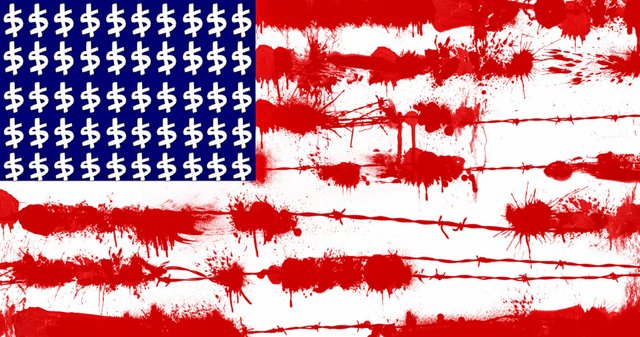The Imperialist Nature of the United States and its Outcome
The United States is a perfect example of imperialism.
The United States is the most powerful country in the world. This is partly because the United States spends more on the military than the next seven top countries in the world combined. This allows the United States to exert a level of control over other countries only ever seen in imperialist regimes. This level of resource consumption for military power takes is a heavy toll on any country, and there are few good possible endings.
The United States Has a New Brand of Imperialism
The United States rarely directly annexes territories like empires of the past, but controls them indirectly. This is done through our insane amount of military bases and spending. The United States has over 800 military bases in over 70 other countries.
The military bases are often used for spying, operations out of the direct influence of the United States, and to pressure the native governments. Many of these countries, Japan and Germany for example, don’t actually want the bases on their land. The bases often have a negative effect on the civilian population around them. They are much like the British Raj were in India. The soldiers are kept socially separate and above the local population, often without responsibility for crimes committed by them. However, the United States does not have complete control over the cities like imperial cities of the past. The most common approach of other countries is to limit the number of bases and keep them away from the population, because pushing them out forcefully could incite a response from the United States.
[1][2]
The United States has Done it Before
Fear of retaliation by the United States is not unfounded. The United States has a track record of meddling with foreign governments. There are a reported 41 successful attempts at regime change by the United States. These had varying levels of success. One example is when the United States helped get Saddam Hussein into power, for more control over Iraq. Iraq has some of the largest oil reserves in the world and the United States depends on them. This became a problem when it Saddam Hussein became unreliable. This is what led to the Iraq war. An unjustified and brutal war in the eyes of the world, and even led to the creation of the terrorist organization Isis. Even with the inevitable negative consequences the end goal was still reached, privatizing the extraction and refining of Iraq's oil.
[3][4]
The Privatization of the Military
Privatization has become a theme in the United States military. In 2014 alone 285 billion dollars were spent by the government on private military contracts, that was 8% of the federal spending. Private contractors over are useful for multiple reasons, they do not need to be mentioned in any public reports and they feed the military industrial complex. Since the government does not need to report to the public on what private contractors are doing, this makes it so the government is not accountable to the people. These private contractors get massive amounts of profit, as much as 30 billion in the year 2012 for 59 of the most publicly traded companies.
[5][6]
The Effects on the Economy
Massive amounts of military spending takes a major toll on the economy. The military spending of the United States in the year 2016 alone was 585 billion dollars. That spending is greater than the next seven countries in the world combined. This has a major impact on the deficit. The Chinese spend the second most on their military, at the equivalent of 146.6 billion in 2016. The difference between our military budgets is within 2 billion of closing out the federal deficit, but there is another factor that sets the two countries apart. China has nearly four times the population of the United States.
[7]
The United States deficit is sold off as debt to the Federal Reserve. As this debt increases, the interest rate on the debt also increases, increasing the deficit. This means they must print more money to pay it off leading to higher inflation. This situation has many risks to it. Hyperinflation is one possibility, and few economies survive that. The other outcome would be a default on the national debt, which should be avoided at all costs. A default on the national debt would cause a major increase in interest rates on all types of loans, decrease the value of the dollar, the dollar would stop being the world's reserve currency, and the United States wouldn’t be able to pay pensions or salaries for its employees. This would cause a crash in the world economy. The United States deficit has been increasing and it shows no signs of stopping.
[8][9][10]
The new brand of secretive imperialism by the United States does not protect it from the problems of running an empire. As time goes on the United States is hated more and more as its actions catch up with them. The toll of United States militarism will eventually be too much to handle and unless something drastic is done, will mean the end for the rule of the country. All empires eventually collapse, there is no reason the United States one will be any different.
[1] [2] [3] [4] [5] [6] [7] [8] [9] [10]

good post
I have a feeling you didn't read it.
i feel pity for usa
Pity is a spook
Spook in the sense of ghost, or Spook in the sense of Spy?